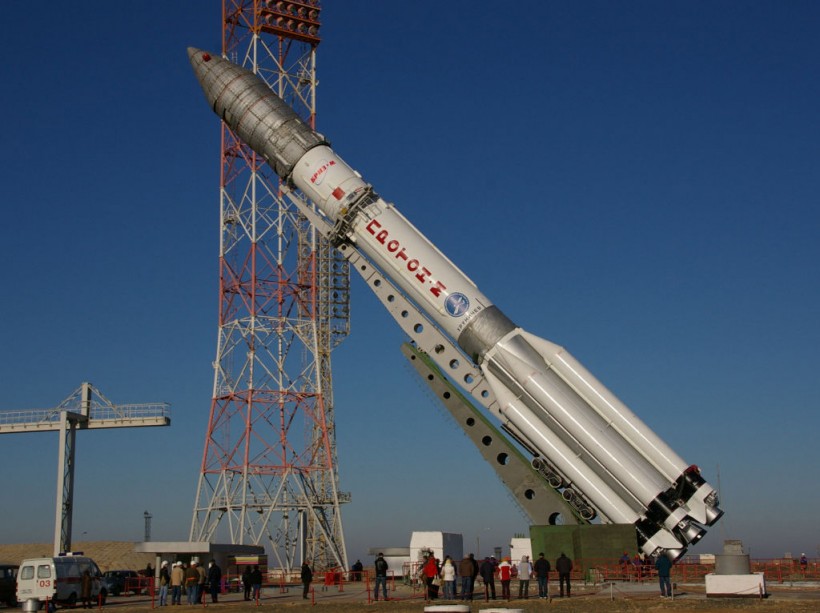Rocket maker Astra successfully completed its orbital mission on Tuesday despite a bit of a snag. During and after the debut, the company's stock moved drastically.
Astra's rocket LV0009 lifted out from Astra's launchpad in Kodiak, Alaska, carrying three customers' satellite payloads on a mission for launch services business Spaceflight.
The rocket took off from the Pacific Spaceport Complex on Alaska's Kodiak Island at 12:22 p.m. EDT on March 15. In less than nine minutes, the 43-foot-tall (13-meter) rocket sent its cargo into their assigned orbit 326 miles (525 kilometers) above Earth.

A Russian Proton-M rocket carrying a Luxembourg Astra-1M telecommunications satellite is placed on the launchpad at Kazakhstan's Baikonur cosmodrome on November 2, 2008. The lift-off is planned for November 6.
Astra Bounces Back From Recent Rocket Failure
Astra recovered from a launch failure last month with a historic triumph, putting satellites in Earth orbit for the first time.
Carolina Grossman, Astra's director of product, cautioned during a livestream of the launch that the business wouldn't know if the satellites deployed successfully right away since the rocket wasn't able to communicate ground readings in the minutes after it reached space.
We can confirm the successful deployment of the satellites on Spaceflight's Astra-1 mission today. We are grateful to our partner @spaceflightinc and incredibly proud of this mission success. #AdAstra
— Astra (@Astra) March 15, 2022
But another update has arrived on Twitter: "We can confirm the successful deployment of the satellites on Spaceflight's Astra-1 mission today."
Astra CEO, co-founder, and chairman Chris Kemp claimed per Space.com that the flight was "normal" approximately an hour after liftoff.
The rocket company claimed in a CNBC report that they made changes to the design of the rocket's fairing and its software before launching Tuesday's flight.
ALSO READ: Astra Space Fails to Bring NASA CubeSat to Orbit After Rocket's Upper Stage Flew Out of Control
Astra's Roller Coaster Journey
In recent months, the corporation has been on a roller coaster. Before its first success in November 2021, Astra made five failed attempts to launch a rocket into space.
Astra is one of the hundreds of startups planning to utilize relatively tiny, lightweight rockets to make repeated journeys to space to drop off satellites - not to be confused with Elon Musk's SpaceX's significantly larger rockets or Jeff Bezos' suborbital space tourism rocket, Blue Origin.
CNN said that only Astra, Rocket Lab, and Virgin Orbit, based in California, have demonstrated that their rockets can get the job done.
All of those businesses have now gone public through SPACs, or "special purpose acquisition companies," which act as investment placeholders on the stock market while the fund's supporters look for a deal.
After that, the target firm takes over the SPAC's trading ticker, allowing it to go public without the financial disclosure or scrutiny that typical IPOs entail.
That isn't to imply that Astra and the others won't succeed. However, the firm is up against the severe competition.
Astra intends to mass-produce rockets to reduce costs, but it does not place a premium on flawless performance.
RELATED ARTICLE: Astra Space Aborts First Florida Launch for the 2nd Time Due to Small Telemetry Issue
Check out more news and information on Space in Science Times.
![Apple Is Developing Homegrown Chips to Run AI Tools in Data Centers [Report]](https://1721181113.rsc.cdn77.org/data/thumbs/full/53497/89/56/50/40/apple-is-developing-homegrown-chips-to-run-ai-tools-in-data-centers-report.jpeg)


![Colorado River Toad Releases Psychedelic Compounds That Could Treat Depression, Anxiety [Study]](https://1721181113.rsc.cdn77.org/data/thumbs/full/53533/89/56/50/40/colorado-river-toad-releases-psychedelic-compounds-that-could-treat-depression-anxiety-study.jpeg)









![China's Chang'e 6 Moon Mission Appears to Include an Undisclosed Mini Rover [See Photos]](https://1721181113.rsc.cdn77.org/data/thumbs/full/53548/258/146/50/40/chinas-change-6-moon-mission-appears-to-include-an-undisclosed-mini-rover-see-photos.jpeg)
